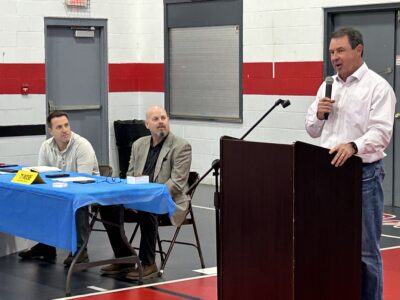Ohio Legislators Talk On Abolishment Of State Property Tax

Photo by Joselyn King Ohio General Assembly members representing Belmont County addressed those attending a Belmont County Trustees Association meeting Thursday night at the St. Clairsville Recreation Center. Pictured from left are Rep. Ron Ferguson, R-Wintersville; Rep. Ty Moore, R-Caldwell; and Sen. Brian Chavez, R-Marietta.
ST. CLAIRSVILLE — At least two of the state legislators representing Belmont County in the Ohio General Assembly say they will personally vote “no” if an amendment to abolish property taxes in Ohio goes before state voters next year.
Sen. Brian Chavez, R-Marietta, Rep. Ty Moore, R-Caldwell, and Rep. Ron Ferguson, R-Wintersville, addressed those attending the Belmont County Trustees Association meeting Thursday night at the St. Clairsville Recreation Center.
The three spoke of current happenings in Columbus, but many in the crowd specifically wanted to hear their thoughts on proposals to eliminate property taxes in Ohio. One idea is to put a referendum on the issue before voters in November 2026.
Union Local School District Zac Shutler noted as Ohio continues to cut state funding to its public schools, more and more school districts are being forced to place the burden of school funding on homeowners by asking them to approve levies. Often these levies don’t pass, especially in rural school districts.
Shuler said he sees “a reckoning” coming.
“There’s definitely a reckoning coming,” Moore said. “I know people are wondering about the property tax. I know there are people here who are opposed to the property tax, but as a former county commissioner I say it’s pretty important to us.
“If I have to walk into the ballot box next, I am proudly voting to not abolish the property tax.”
The money pays for such things as ambulance service in areas where there may only be one ambulance, he continued.
“If my kid falls and breaks his leg, and I voted to save $1,900 (in property taxes), the closest ambulance may be in Sarahsville,” the Noble County resident said.
Ferguson said he feels he might support eliminating the property tax, but that scrutinizing loopholes in Ohio’s tax laws is going to be necessary to fill the financial gap.
“If the decision is made to get rid of the property tax, it’s going to be a new world and we’re going to have to figure out how we are going to take care of it,” he told those present.
Ferguson reports that the state property tax generates about $22 billion annually for the state. While as much as $5 billion in government spending possibly could be eliminated, at least $17 billion “would still need to be made up.”
“It’s not going to be easy, but it is also not easy paying those property tax bills,” Ferguson continued.
Sen. Brian Chavez, R-Marietta, serves as vice chairman of the Senate Finance Committee.
He explained other states who are considering eliminating their property taxes have resources that make up the difference. For example, in Florida, tourism brings in tax revenue while Texas and Alaska have placed “exorbitant severance tax” on the oil and natural gas industry to generate revenue for the state.
“I would vote to not eliminate property taxes because there is a block of unintended consequences,” Chavez said. “It’s an emotional issue. I get it.
“I don’t disagree with Rep. Ferguson in that there are a lot of opportunities to clean up some things. It’s a zero sum game.”
The state spends more than $100 billion each year, with Medicaid and education having the largest cost, he reported.
“Then the narrative becomes, ‘You don’t care about people,'” Chavez said. “You have two very emotional issues that make up the biggest part of the budget.
“In order to get rid of the property tax, we have to make it up somewhere. All the property taxes are local – so it would have to be through sales tax and income tax,” he explained.

